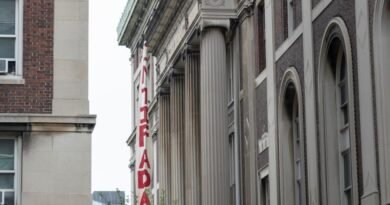Congress Has the Power to Halt Lawfare and Partisan Bias in Washington, DC

As we look ahead to a new presidency, it’s essential to consider how we can improve Washington, DC.
I’m not merely referring to the notion of “draining the swamp” and possibly reducing the size of the federal bureaucracy. My focus is on addressing the inherent issues within the District of Columbia itself.
The Constitution, in Article 1, Section 8, mandates that Congress shall “exercise exclusive Legislation in all Cases whatsoever, over such District (not exceeding ten Miles square) as may, by Cession of particular States, and the Acceptance of Congress, become the Seat of the Government of the United States.”
The underlying idea was to establish a neutral ground for the government, free from the influence of any specific state or political party.
Instead of having a local government, Congress was intended to govern the District.
It was believed that a locale meant to represent the nation as a whole should be governed by the nation collectively.
However, this concept has evolved over time.
The passage of the 23rd Amendment in 1961 enabled the District to participate in presidential elections.
Then, in 1973, the “home rule” law was enacted, granting the District self-governance with its own elected officials, prosecutors, and courts.
This might not have been a significant concern had Washington, DC’s political landscape aligned with that of the nation. Yet, it remains a predominantly one-party jurisdiction.
The local government is overwhelmingly controlled by Democrats, significantly skewing presidential election results: Despite a resounding loss to Donald Trump last month, Kamala Harris garnered 92.5% of the DC vote compared to Trump’s 5% — figures not far off from the 93% received by 2016’s loser Hillary Clinton.
This lopsided political landscape poses serious challenges for any Republican facing legal proceedings in the District.
As the nation’s capital, DC frequently hosts significant political trials; yet, its jury pool is as one-sided as those that tried the Scottsboro Boys.
Indeed, when special prosecutor Jack Smith sought to indict Donald Trump, Democratic attorneys openly boasted about the bias of the DC jury pool.
Marc Elias proudly noted that in a city of 700,000, Trump received merely 676 GOP primary votes in 2024.
MSNBC’s Lawrence O’Donnell quipped that Trump was more likely to win the lottery than to find a sympathetic juror in DC.
Moreover, DC juries have a reputation for acquitting high-profile Democrats, such as lawyer Michael Sussman, who was charged by special counsel John Durham for allegedly lying to the FBI about “Russiagate” rumors but was ultimately acquitted by what many described as a “nightmare jury.”
(Wisconsin Senator Ron Johnson labeled the verdict as evidence of “two systems of justice” in America.)
Additionally, DC’s identity as a Democratic stronghold creates an environment marked by one-sided governance often influenced by a narrow group of elites.
Washington has transformed into a company town dominated by federal employees, lobbyists, and journalists, nearly all of whom share a similar political affiliation and social upbringing.
Having a one-party capital city administering a two-party nation is clearly problematic, and the resulting unbalanced judicial system exacerbates the issue.
However, I have a few proposals.
The most radical option would be to entirely dissolve the District of Columbia.
The Constitution grants Congress the authority to create and govern such a district; however, it is not mandated that such a district must exist.
What is currently known as DC could be handed back to Maryland, from whence it was originally taken. Given that Maryland is already a blue state, this wouldn’t significantly alter the political landscape.
Nevertheless, it would dramatically change the dynamics of political trials.
The Fourth Amendment specifies that juries should be composed of individuals from the state and district in which the crime occurred.
If DC were to no longer function as an independent entity, the judicial district overseeing federal agencies could be expanded to include parts of neighboring states, broadening the jury pool and allowing for fairer trials.
A potentially more effective solution would involve relocating much of the federal government out of the District altogether, moving agency headquarters to more affordable regions outside the capital.
Consider placing the FBI headquarters in Plattsburgh, NY, or shifting the Department of Agriculture to Kirksville, MO, or Quincy, IL, among other options.
The remaining DC might end up being more diverse than the current homogenous company town.
Decentralization would also distribute federal funding more evenly, rather than concentrating it in one area.
(Interestingly, five of the richest counties in America are situated around Washington, DC.)
This would also pose greater challenges for lobbyists, influence peddlers, and similar entities.
Even merely revoking home rule in the District and reinstating Congress’s governance could deliver some improvements.
It is historically evident that DC functioned more effectively before 1973 than it has since then.
Yet, I believe we need more profound reforms.
We must adopt innovative measures and seriously consider these solutions and others.
A politically diverse nation should not be governed by a narrow, single-party elite.
Glenn Harlan Reynolds is a law professor at the University of Tennessee and the founder of the InstaPundit.com blog.



